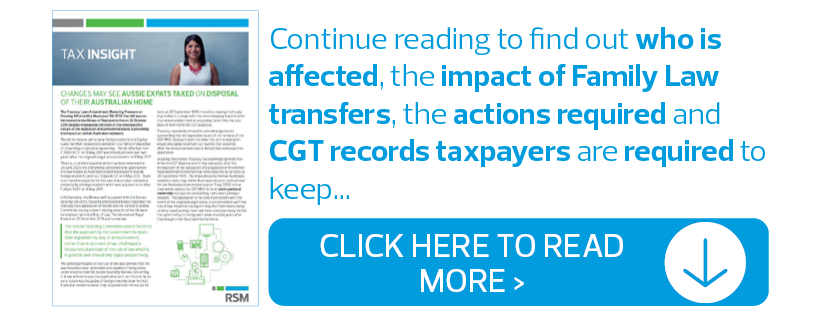Changes may see Aussie expats taxed on disposal of their Australian home
The Treasury Laws Amendment (Reducing Pressure on Housing Affordability Measures) Bill 2019 (the Bill) was re-introduced to the House of Representative on 23 October 2019 despite widespread criticism of the retrospective nature of the legislation and unresolved issues surrounding the impact on certain Australian residents. 
The Bill introduces law to deny foreign residents the Capital Gains Tax Main Residence Exemption (CGT MRE) irrespective of citizenship or period of ownership. The Bill, effective from 7.30pm AEST on 9 May 2017 was introduced well over two years after the original budget announcement on 9 May 2017.
There is a transitional period which has been extended to 30 June 2020; the transitional period will only apply where the sale relates to Australian residential property held by foreign residents prior to 7.30pm AEST on 9 May 2017. There is no transitional period for the sale of Australian residential property by a foreign resident which was acquired on or after 7.30pm AEST on 9 May 2017. 
Unfortunately, the Bill was swiftly passed with the Senate ignoring concerns raised by professional bodies regarding the retrospective application of the Bill and the Senate Standing Committee issuing a report stating aspects of the Bill were inconsistent with the Rule of Law. The Bill received Royal Assent on 12 December 2019 and is now law.
The Senate Standing Committee raised concerns that the approach by the Government to ‘back-date’ legislation by way of announcement, rather than enactment of law, challenged a fundamental principle of the rule of law which is in in general, laws should only apply prospectively.
The general principles of the rule of law also provide that the law should be clear, accessible and capable of being easily understood so that the people bound by the law can comply it. A law with retrospective application such as this one, by its very nature was incapable of being known by (now former) Australian residents when they acquired their homes (as far back as 20 September 1985) therefore making it virtually impossible to comply with the record keeping requirements that would enable them to accurately determine the cost base of their home for CGT purposes.
Treasury repeatedly refused to acknowledge issues surrounding the retrospective nature of the removal of the CGT MRE. Instead, it took the view that as the legislation would only apply to certain CGT events that occurred after the announcement date it did not have retrospective application.
In taking this stance, Treasury has seemingly ignored that while the CGT disposal event may take place after the introduction of the legislation, the acquisition of the former Australian main residence may have occurred as far back as 20 September 1985. The implications for former Australian residents (who may still be Australian citizens) and sell their former Australian main residence post 1 July 2020, is that they will be denied the CGT MRE for their entire period of ownership, not just the period they have been a foreign resident. This application is not only inconsistent with the intent of the original budget policy, it is inconsistent with the rule of law. Impacted taxpayers may find themselves being unfairly taxed as they have now been retrospectively denied the opportunity to comply with a law enacted years after they bought their Australian family home.


